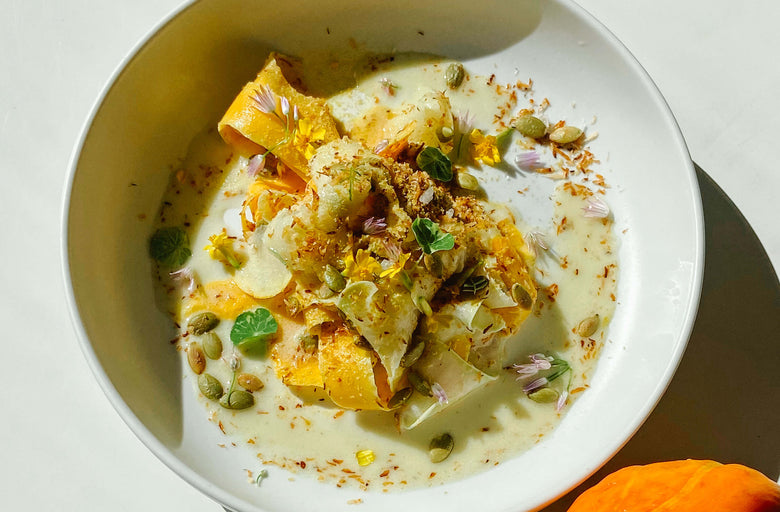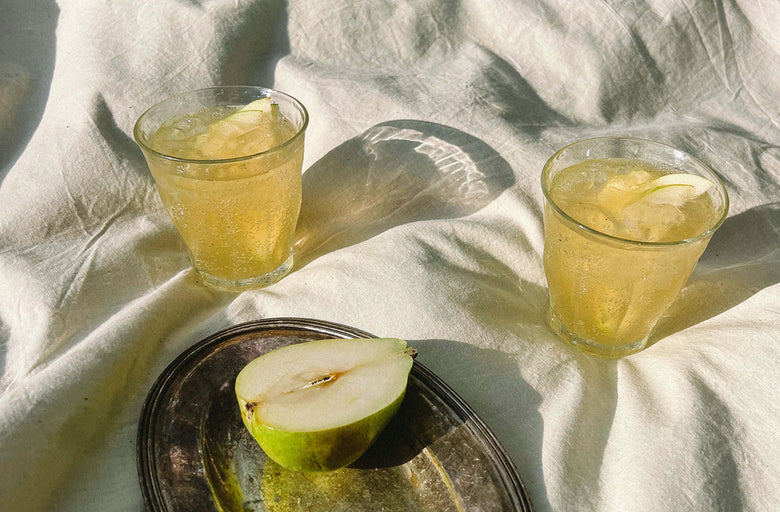Food astounds us. Not just in terms of flavor, or the ability to spark joy, but in its power to transform and heal. We feel especially inspired when we hear your stories about eating more plants, and Dr. Mona Vand is no exception. Below, the doctor of pharmacy and wellness savant reveals how transitioning from a vegan to a plant-based diet had a profound effect.
With so many new and old diets constantly circulating around our newsfeeds, it can be overwhelming when it comes to understanding the differences and benefits of each one. It doesn’t help that it only gets more complicated when you start to add sub-categories, like ovo-vegetarianism or plant-based vegan. If you’ve been following me for a while, you probably know that I started off as a meat-eater, then transitioned into being a vegan, and am now a fully plant-based vegan. Because I’ve kind of been through it all, I wanted to give you guys a full breakdown on why plant-based eating has changed my life (for the better) and also provide small steps that you can do to become either totally or partially plant-based.
First, let's break down what it means to be plant-based versus what it means to be vegan. For me, eating plant-based means that your diet is rich in whole foods: fruits, vegetables, whole grains, nuts, seeds, etc. The main difference between a vegan lifestyle and a plant-based lifestyle is that when you’re vegan, you can technically still eat processed foods, like cheese-substitutes or artificial meat, but with plant-based eating, you focus on all-natural, whole foods.
To provide some background information, I actually only went vegan initially to support my family (who were advised to go vegan for heart-health purposes). At first, it was a little daunting because when you’re used to eating a certain way your whole life, it may feel like you have to eliminate everything in your diet just to be vegan. But after a couple of months, I realized that wasn’t the case. I also started to feel 10 times more energetic and just better overall. Even after my family transitioned back into eating meat, I stayed vegan because of how amazing I felt.

When I first made the transition from vegan to plant-based, two of the most common questions I receive are: 1) where do you get your protein and 2) what do you even have left to eat!? My response is always this: 1) there are plenty of ways to get enough protein in your diet without eating meat (I’ll explain further) and 2) I have so much left to eat and I feel so incredibly nourished all the time.
I also started to feel ten times more energetic and just better overall.
In terms of protein: it’s easy to overlook how much protein certain plants pack. Some of the top protein-packed plant-based options include beans, lentils, seeds, nuts, tofu and whole grains. A few of my favorites include red lentils (9g protein per ½ cup), black beans (7.6g protein per ½ cup), tofu (8-15g protein per 3 oz serving), and wild rice (6.5g per 1 cup). Most vegetables are incomplete proteins but if you combine them with some of the options I just mentioned, they become complementary proteins that provide your body with enough amino acids. A few of my favorite protein-filled vegetables include spinach, peas, kale, and chickpeas. If you’re concerned that you’re still not getting enough, an easy way to pack in protein is with a nutrition bar, like Sakara Detox Bars (which have 10g of protein in one bar) or just put a scoop of plant-based protein powder into your green smoothie.
You also don’t have to feel like you need to jump straight into a 100% plant-based diet in order to reap the benefits. Research from the Department of Nutrition for Harvard-affiliated Brigham and Women's Hospital shows that even if you just substitute half a cup of beans or an ounce of nuts for one serving of red meat per day, you can significantly reduce your risk of a heart attack. If you don’t want to go full-throttle and fully commit to this style of eating, it is still beneficial to incorporate plant-based eating habits into your life here and there.
For me, plant-based eating changed my life because of how much it enhanced my mental and physical performance. Food is fuel and it has the power to affect you in so many different ways. Once you start to eliminate meat and processed foods, you start to feel a greater sense of mental clarity and physical strength. I, personally, also felt like I had more control over my mood, my skin looked brighter, I didn’t get as many blemishes or breakouts, I felt lighter, and my overall performance during the day or in my workouts was better.
Eating nutrient-dense meals is a really important part of this process. Nutrient-dense foods are those that contain vitamins, minerals, lean protein, fiber, and healthy fats. Things like broccoli, cauliflower, brussels sprouts, avocado, cantaloupe, walnuts, beans, sweet potatoes, and kale are only a few examples. Also, adding in superfoods (think: goji berries, chia seeds, and spirulina) to your daily routine is a great way to pack in nutrients. If you’re unsure of how to get started, there are so many resources to help you! You can look online for quick inspiration or if you subscribe to one of Sakara Life’s nutrition programs, they deliver idyllic and tasty plant-based meals to your door.
I had more control over my mood, my skin looked brighter, I didn’t get as many blemishes or breakouts... I felt lighter, and my overall performance improved.
Through eating a wide variety of fruits, vegetables, whole grains, and superfoods, you will be nourishing your body with the proper fuel which will benefit you in so many different ways. When you eat things like cashews, oatmeal, and hemp seeds, you’re nourishing your body with zinc. Research shows that zinc is an important micronutrient because it plays a role in thyroid health, skin health, and helps your cells grow and repair. When you eat things like bok choy, tofu, or collard greens, you’re supplying your body with a healthy dose of calcium, which is most commonly known for strengthening and protecting your bones but also helps with muscle and cell function. If you start adding in more whole grains, green veggies, nuts, and seeds, you’ll be helping your body absorb iron, which is another important micronutrient because iron helps your body produce hemoglobin (which carries oxygen throughout the body).
Once you start to understand where to get your protein, how to create nutrient-dense meals, and how much you need to eat to properly fuel your body— you are going to feel and look your best. I’m also the type of person who likes to live life without total restriction, so if I’m absolutely craving something that isn’t plant-based, I don’t limit or penalize myself. I just do the best that I can, as often as I can. There are no strict rules to eating plant-based mainly because it’s not a diet, it's a lifestyle.
More Transformational Food Experiences:
10 Days on Metabolism Super Powder
Does Your Diet Affect Fertility?






